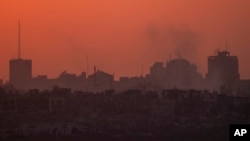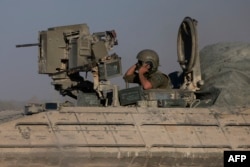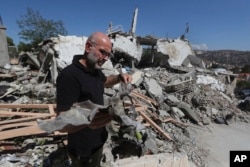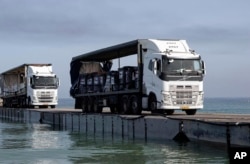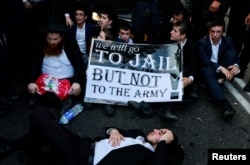Local health officials say Israeli airstrikes killed at least nine Palestinians in the central Gaza Strip on Wednesday.
One airstrike hit a house in Al-Zawyda, killing eight people. Another hit the Nuseirat refugee camp, killing one man. Officials say an Israeli airstrike hit the same camp and killed 23 people one day earlier.
The Israeli military says it hit 25 targets in the Gaza Strip in airstrikes over the past day.
Meanwhile, a separate Israeli attack killed two people in Rafah on Wednesday, according to local medics. Residents said that dozens of homes were destroyed by Israeli tanks in the north of the city. The tanks, which quickly retreated, have been deployed in most of the city since May but had left northern parts of the city largely untouched.
Attacks on Hezbollah
Israeli forces also carried out airstrikes in southern Lebanon Wednesday in the latest attacks targeting Hezbollah militants.
Israel’s military said that its strikes focused on Hezbollah infrastructure, and that Israeli forces also used artillery fire to respond to Hezbollah threats in the area.
Hezbollah fired rockets toward Israel, with the Israeli military saying it intercepted some rockets while others fell into open areas without damage or casualties.
Hezbollah leader Sayyed Hassan Nasrallah said during a speech Wednesday that the militant group will target new areas in Israel if Israeli forces continue killing civilians.
Israeli strikes on Tuesday killed five Syrian civilians in southern Lebanon.
The cross-border clashes between Israel and Hezbollah have raised concerns about an enlarged conflict in the region.
U.S. Defense Secretary Lloyd Austin and Israeli Defense Minister Yoav Gallant discussed the Israel-Hezbollah fighting during a phone call Tuesday, the U.S. Defense Department said.
Pentagon press secretary Major General Pat Ryder said in a statement that the defense chiefs also talked about a temporary pier the United States erected on the Gaza coast to provide another avenue for bringing in humanitarian aid for Palestinian civilians. The pier has experienced several issues, including rough seas that caused it to be detached, and Austin told Gallant that the effort will end soon.
“The secretary stressed the importance of increasing the flow of humanitarian assistance through all land crossings and supporting aid deliveries to Ashdod Port in Israel for onward distribution in Gaza,” Ryder said.
The Pentagon said Austin also “reaffirmed the shared desire of ensuring the enduring defeat of Hamas and securing the safe release of all the hostages held captive by Hamas.”
Cease-fire talks
An Israeli delegation of six officials arrived in Egypt Wednesday, said Egyptian airport officials, as cease-fire talks continue.
The United States, Egypt and Qatar have been trying to negotiate a cease-fire between Israel and Hamas that includes the release of some 120 hostages still held in Gaza, along with a halt in fighting and a surge of humanitarian aid for Palestinian civilians.
Gallant’s office said the Israeli defense chief told Austin that Israel’s military operations in Gaza “have led to the conditions necessary to achieve an agreement for the return of hostages, which is the highest moral imperative at this time.”
Hamas militants killed about 1,200 people and captured about 250 hostages in their October 7 terror attack on Israel that sparked the war. Israel says it believes Hamas is still holding 116 hostages, including 42 who the military says are dead.
Israel has since responded with an air and land assault on Hamas-governed Gaza, which both sides agree has killed more than 38,200 people. Israel says the majority of the dead are combatants. Gaza’s Health Ministry says 38,794 have died, the majority of them women and children, but it does not estimate how many of the dead were combatants.
Nearly three-quarters of Gaza's 2.3 million population is displaced, and nearly the entire population is at risk of famine, according to the United Nations.
Israeli officials announced Tuesday they will begin to send draft notices to ultra-Orthodox Jewish men to fight in the war in Gaza. They were exempt until a Supreme Court ruling in June.
Israeli Prime Minister Benjamin Netanyahu’s government relies on two ultra-Orthodox parties in its coalition.
The decision is expected to cause some tension within the country, with protests previously taking place when the government attempted to enlist ultra-Orthodox Jewish men.
Some information for this report was provided by Agence France-Presse and Reuters.




